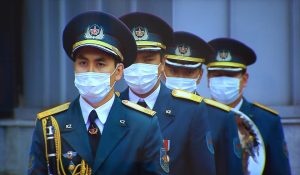On July 5 Kazakhstan went back into a country-wide lockdown as COVID-19 cases spiked. The country’s first lockdown lasted from March 16 to May 11. The second lockdown, which is planned to last at least two weeks, appears to be the first such reimposition of a nationwide lockdown in the world.
As of July 6, Kazakhstan had recorded 48,574 cases of the novel coronavirus since the first cases were registered in mid-March. While the coronavirus2020.kz dashboard, where official statistics are posted, only states 188 deaths, on Sunday Kazakh Minister of Health Alexei Tsoi told reporters that the number of deaths had reached 232. Kazakh authorities said they would update death statistics once a week.
In recent days, Atyrau region had led with the highest daily new case numbers. Of the 1,403 new cases announced on Monday (814 of which were reported as asymptomatic), 325 were in the Atyrau region, where the significant Tengiz oil field is located. The field saw a spike in cases beginning in early June. After the cities of Nur-Sultan and Almaty, Atyrau region has the third largest concentration of cases.
The second “lockdown” is, at the outset, not as harsh as the first. While bus and car traffic between regions will be suspended, air and rail travel between regions will continue (with the already existing restrictions). International air traffic will continue, but the list of approved countries will not be expanded.
Public gatherings will see the return of previous restrictions, the harshest on citizens over 65 years, who will be expected to stay home. People will be allowed to engage in individual outdoor fitness activities and gather outdoors, but in groups no longer than three and public events — entertainment, sports — as well as family and holiday gatherings are banned.
A host of nonessential business will close again, including salons, gyms, museums, as well as as mosques and churches. Kindergartens, except those providing services for essential workers, will close, as will camps, covered markets, and cinemas. Grocery stores, pharmacies, and open markets will continue to operate and a variety of work will continue including construction, production, and agricultural work, as well as car washes, banks, and service centers, but with restricted hours.
At least 80 percent of state employees and employees of national companies and other organizations will work from home.
According to RFE/RL’s Kazakh Service, Kazakhs have complained about difficulties obtaining COVID-19 tests and overcrowded hospitals. In addition, there have reportedly been long lines at some pharmacies and difficulty obtaining certain medications. Kazakh President Kassym-Jomart Tokayev tweeted on Sunday that the authorities would hold accountable those caught inflating prices of medicines.
After the end of its first lockdown, Kazakhstan attempted to put in place a phased re-opening, but the patchwork effort wasn’t able to keep case numbers under control. Kazakhstan may have missed its shot to control COVID-19 by re-opening too soon. Whether the new two-week lockdown will have an impact is uncertain. The authorities have reserved the possibility of tightening and lengthening the lockdown.
The same economic questions — soaring unemployment and a looming recession — will haunt Kazakh authorities even as they try to impose a national lockdown again. In the battle between economic and public health, neither has been adequately served. Economies cannot recover without healthy publics — to make and buy and sell — and publics cannot kick COVID-19 without restrictions, which will necessarily hamper traditional economic activity.

































